Suphanee’s husband Somyot, was shot and killed by suspected Muslim insurgents on May 28, 2005 in Janae District in southern Thailand. Suphanee was with Somyot when he was killed, along with their son Apichok, who was just over 1 year old at the time.
Suphanee, a Buddhist, now lives in a sufficiency economy village for widows near Rotan Batu in Narathiwat’s Muang district with her five children, ages 2 to 15. The village, dubbed the ‘Widow Farm’ by locals, is sponsored by the Thai royal family and is currently home to the widows of 103 men killed during the insurgency in the Muslim-majority provinces of Narathiwat, Yala and Pattani.
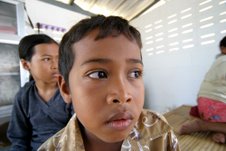 Hoisting her son Apichok up onto her lap, Suphanee describes the day they were attacked. "My husband worked on a rubber plantation," she says, "we were riding our motorbike to the plantation when two boys rode up from behind us, and the one on the back started shooting."
Hoisting her son Apichok up onto her lap, Suphanee describes the day they were attacked. "My husband worked on a rubber plantation," she says, "we were riding our motorbike to the plantation when two boys rode up from behind us, and the one on the back started shooting."
Somyot was shot and later succumbed to his wounds. Suphanee was hit in the right shoulder, and her son Apichok was grazed across the forehead by a bullet. Such incidents have become commonplace in Thailand’s three volatile southern provinces where more than 1,500 people have been killed since January 2004 by violence blamed on Muslim insurgents and government security forces. Muslim insurgents say they are fighting for a separate homeland in the provinces of Yala, Narathiwat and Pattani, which were annexed by Siam (now Thailand) in 1902.
Caretaker Prime Minister Thaksin Shinawatra has faced growing criticism regarding his heavy-handed approach to the insurgency in Thailand’s three Muslim majority provinces. In July, the government voted to extend an emergency decree in the south-but the shadowy figures carrying out the attacks show no signs of backing down. If anything, the insurgents are growing bolder in their attacks.
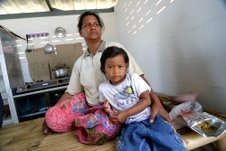 In July, insurgents staged a well-coordinated attack on a police checkpoint in Pattani that left three members of the security forces dead. A few days later, insurgents dressed in school uniforms walked into a classroom in Narathiwat province and killed a teacher in front of 30 students. Bombings are also becoming a more common occurrence.
In July, insurgents staged a well-coordinated attack on a police checkpoint in Pattani that left three members of the security forces dead. A few days later, insurgents dressed in school uniforms walked into a classroom in Narathiwat province and killed a teacher in front of 30 students. Bombings are also becoming a more common occurrence.
Reports suggest the insurgents receive widespread support from locals as well who often help to facilitate attacks. It is also thought that the insurgents could have ties to al-Qaida and Jemaah Islamiya, the group responsible for the 2002 and 2005 Bali bombings.
The story of southern Thailand is increasingly a tragic tale of families ripped apart by consequence. The overwhelming majority of those killed have been men, and with their passing they leave behind a legacy of countless widows and children forced to grow up in a climate of fear. Many women are now left to try and support themselves and their children with little education or job training-a consequence of social practices where men bear the primary burden of earning the family income.
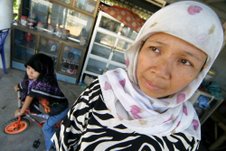 For Suphanee the nightmare did not end after the initial attack. "While I was recovering the killers’ friends tried to come after me," she explains, "They came looking for me at my home. I had to hide and later sneak away. That’s when I came to the Widow Farm."
For Suphanee the nightmare did not end after the initial attack. "While I was recovering the killers’ friends tried to come after me," she explains, "They came looking for me at my home. I had to hide and later sneak away. That’s when I came to the Widow Farm."
For many widows, their main concerns are earning a living and trying to scrape together enough money to send their children to school. Suphanee has four children in school, and admits that money is tight, but she also has other concerns at the moment.
"Soon I am going to court to testify against the killers, but I am afraid," she says, "Now I never leave the village by myself. If I go to the market, I go with soldiers."
Set against a backdrop of mangroves, rubber plantations and dense jungle, the uniform white homes of the village are built duplex-style with a concrete foundation, living quarters upstairs, and a carport and open-air kitchen area downstairs. The final goal of the project is to build 150 homes, due to be completed this month.
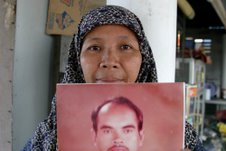 In addition to providing widows with a house, they each receive two rai of land (less than one acre) on which many grow fruits, vegetables, herbs and rice, or raise ducks and chickens. The project was launched in September 2004 by Thailand’s Queen Sirikit, who donated 20 million baht of her own money to purchase the land on which the village is now located. The village, covering 271 acres, is intended to be self-sufficient with residents living off the land and profits from the produce they sell at local markets, but most widows are finding it difficult to make ends meet.
In addition to providing widows with a house, they each receive two rai of land (less than one acre) on which many grow fruits, vegetables, herbs and rice, or raise ducks and chickens. The project was launched in September 2004 by Thailand’s Queen Sirikit, who donated 20 million baht of her own money to purchase the land on which the village is now located. The village, covering 271 acres, is intended to be self-sufficient with residents living off the land and profits from the produce they sell at local markets, but most widows are finding it difficult to make ends meet.
Kamolwan Tipmanee, also a Buddhist, is a 37-year-old mother of two. Absent-mindedly brushing her fingers across the scars on her right arm, she meticulously recounts the story of her husband’s death with great clarity. "We were on the way to see our family, driving our motorbike along the road from Narathiwat to Tak Bai. It was a Wednesday morning, at about 9:30. Two teenagers were following us and started shooting at us from behind."
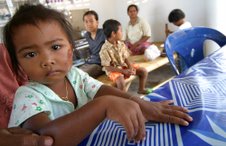 Kamolwan’s husband Somsak, a police officer, was killed instantly. Kamolwan was shot in the right arm. The bullet entered the back of her arm, crushing the bone and exiting on the other side, an injury which still gives her a great deal of pain.
Kamolwan’s husband Somsak, a police officer, was killed instantly. Kamolwan was shot in the right arm. The bullet entered the back of her arm, crushing the bone and exiting on the other side, an injury which still gives her a great deal of pain.
Kamolwan receives a 5,000 baht government pension for her husband each month, but she says it is not enough. "Because of my arm, there are many jobs I cannot perform," she says. "Plus, I have two children so send to school. One is in primary school and my oldest daughter is studying in the fishing village in Pattani learning about fish farming. I worry about her a lot because she is away."
For Kamolwan, finding a job is doubly hard because she lacks an education as well. "When I was studying in [high school]," she explains, "my mother got very sick so I had to quit school and I never finished. Now I’m trying to complete my education," she says.
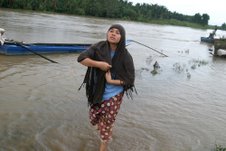 Nisah Doramean echoes Kamolwan’s thoughts. Nisah, like many Muslim women in the south, had never had any kind of formal career training before her husband was murdered. "I baked breads and cookies sometimes to sell in the village, but I’d never had a real job. After my husband was killed, everything was difficult."
Nisah Doramean echoes Kamolwan’s thoughts. Nisah, like many Muslim women in the south, had never had any kind of formal career training before her husband was murdered. "I baked breads and cookies sometimes to sell in the village, but I’d never had a real job. After my husband was killed, everything was difficult."
"Now I’m working in the health center in the village, but in seven months the contract finishes and I won’t have a job. I don’t know what I will do. I can’t work at gardens on the farm because I get heat sickness."
Nisah’s husband Nima was gunned down in December 2004 in a fatal shooting in Cho Airong village. Nima had been a fish merchant by trade, but was also an assistant to the village chief in Cho Airong, which is why it is thought he was targeted.
Nisah, a mother of five, admits that she fears for their future. "I worry because my son and daughter are unemployed. Money is a problem. I have one daughter who is still in school, and others who were not able to finish school after my husband died."
Nirosnanee, 12, still attends school in Narathiwat, but school fees are a burden for the family. For her to attend school it costs 3,000 baht per semester, plus the cost of traveling to and from school each day (50 baht) and lunch costs (20 baht). Working at the health center, Nisah receives a salary of just 4,500 baht per month.
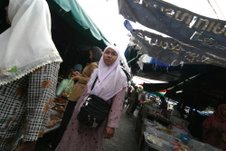 Talking with these women, the overwhelming majority of which are Muslim, it is not difficult to recognize the sense of fatigue and melancholy in their voices. Each woman holds herself differently when she speaks about her husband, and what she wants for the future. Suphanee puts on a brave face, defiant of those who would threaten her and her family. Nisah carries herself with a reserved grace, bringing her children closer as she speaks.
Talking with these women, the overwhelming majority of which are Muslim, it is not difficult to recognize the sense of fatigue and melancholy in their voices. Each woman holds herself differently when she speaks about her husband, and what she wants for the future. Suphanee puts on a brave face, defiant of those who would threaten her and her family. Nisah carries herself with a reserved grace, bringing her children closer as she speaks.
Kamolwan Tipmanee, though, looks to the future, conveying perhaps what the others are feeling inside. "I want to be strong again," she says, "I don’t want to be dependent. I just want to find some work and live like a normal person again."
